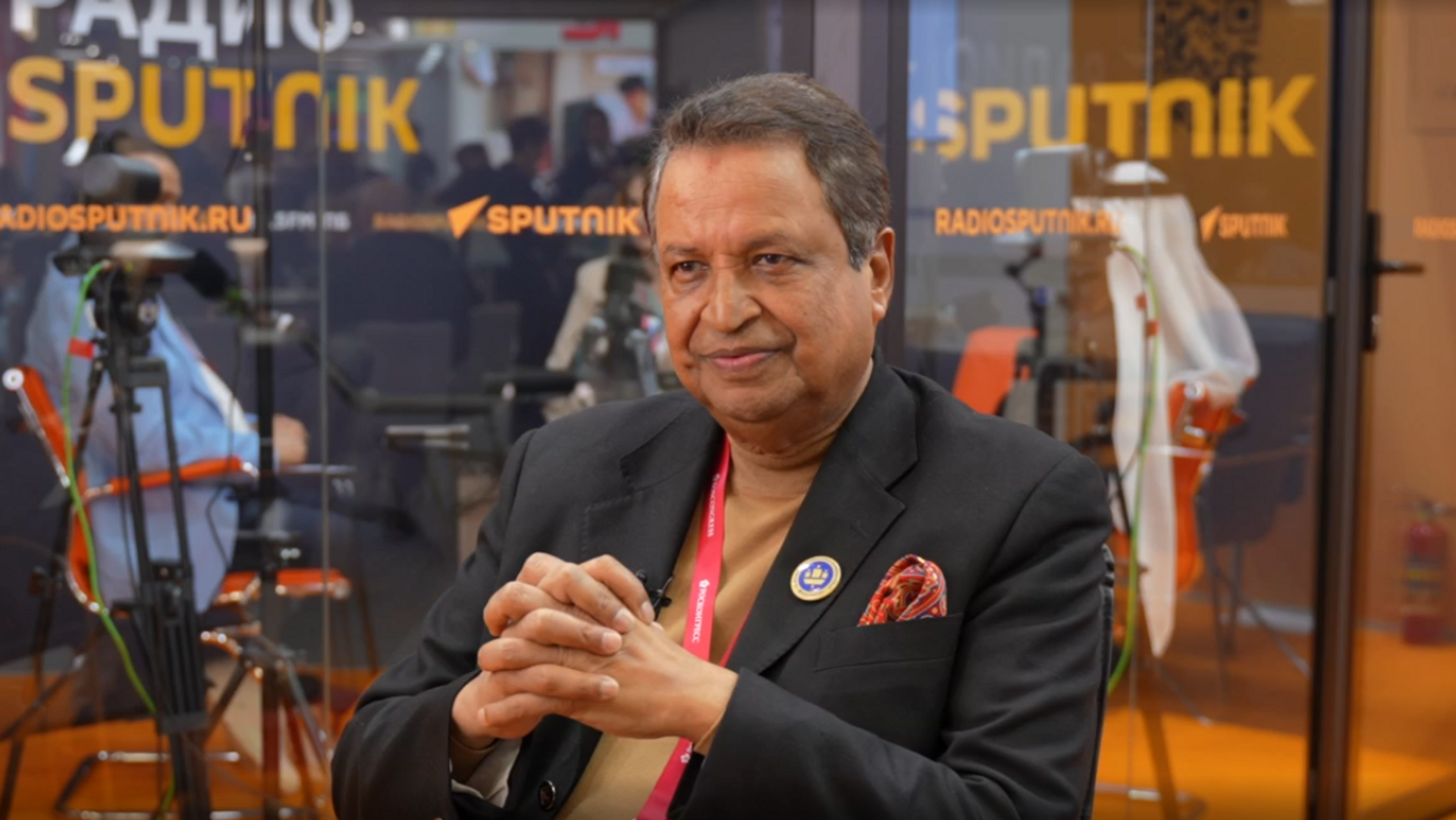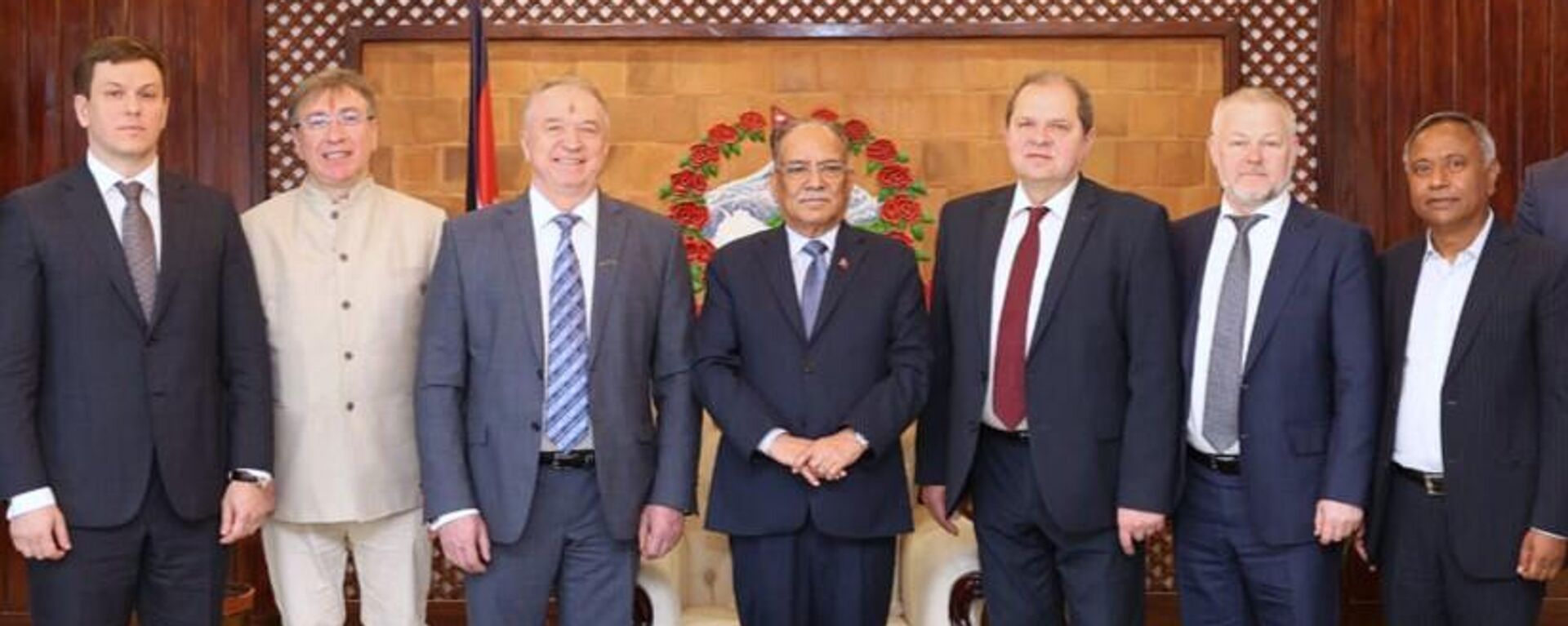https://sputniknews.in/20250620/nepal-next-big-investment-hub-for-russian-businesses---nepalese-billionaire-9328259.html
Nepal: Next Big Investment Hub for Russian Businesses - Nepalese Billionaire
Nepal: Next Big Investment Hub for Russian Businesses - Nepalese Billionaire
Sputnik India
Nepalese billionaire and Chairman of the Chaudhary Group, Binod Chaudhary, shared insights into shifting global power dynamics, the role of BRICS and why future international partnerships must be more transactional than strategic.
2025-06-20T20:16+0530
2025-06-20T20:16+0530
2025-06-20T20:16+0530
indo-russian relations
brics
g7
nepal
russia
india
ease of doing business index
brics expansion
brics currency
st. petersburg international economic forum (spief)
https://cdn1.img.sputniknews.in/img/07e9/06/14/9329990_0:0:1216:685_1920x0_80_0_0_e47d8ef96d9eabe9a26e2eaafee74002.png
A broader shift is taking place away from old-world alliances like the G7, and a new geopolitical triangle—Russia, Africa, Asia—is emerging, Nepalese billionaire Binod Chaudhary, Member of Parliament and CEO of Chaudhary Group (CG), said in an interview with Sputnik India ahead of his address at the St. Petersburg International Economic Forum (SPIEF).With Africa’s demographics, Asia’s innovation, and Russia’s resources and technology, Chaudhary believes this triangle could be a powerful counterweight to the fractured old guard of Western alliances.He emphasised that the time has come to embrace a new model of international cooperation—one rooted not in legacy alliances but in pragmatic, interest-driven collaboration.He pointed out that this change does not signal a breakdown in global cooperation—but rather a recalibration. Countries are still willing to work together, but with clearer expectations and tangible benefits.Can BRICS Deliver in This New Order?Asked whether BRICS could evolve to serve this new transactional model, Chaudhary was both hopeful and critical.“BRICS is definitely a reality, but I’d like to see it move forward faster,” he said. “Some countries within BRICS are reluctant to push the agenda too far and risk being torn in the process,” Chaudhary added.He emphasised that BRICS nations must redefine their shared purpose.Russia and Nepal: Rediscovering SynergiesChaudhary pointed out significant potential in strengthening economic ties between Russia and Nepal, building on a century-old relationship that has faded in recent decades.“Russia has always been a strong partner for Nepal for over 100 years. Russians have built roads and factories in Nepal, and their support has been friendly,” he said. “But many Nepalese businesses seeking technology, partners, or financial resources don’t think of Russia today. They go to the US, Western Europe, Japan, Korea, or China,” Chaudhary added.He cited missed opportunities, including dormant Russian investments in Nepal, and encouraged Russian businesses to consider Nepal as a regional entry point.Sectors like IT, cybersecurity, aviation, infrastructure, and hydropower were highlighted as ripe for collaboration.He urged Russian companies to consider setting up data centers, while suggesting Russian banks channel funds held in India into Nepal’s long-term infrastructure projects.Chaudhary pointed out that Nepal’s strategic position and economic arrangement with India make it an attractive investment destination for Russia.He highlighted that the ease of doing business remains unproven, emphasising the need for the country to collaborate with the business community to foster success, as one success often leads to many.
https://sputniknews.in/20240423/russian-business-leaders-hold-bilateral-trade-talks-on-cooperation-with-india-nepal-7199628.html
nepal
russia
india
Sputnik India
feedback.hindi@sputniknews.com
+74956456601
MIA „Rossiya Segodnya“
2025
Sangeeta Yadav
https://cdn1.img.sputniknews.in/img/07e6/0c/0f/110602_0:0:641:640_100x100_80_0_0_c298016a79eb02ef8caa9d1f688c12a5.jpg
Sangeeta Yadav
https://cdn1.img.sputniknews.in/img/07e6/0c/0f/110602_0:0:641:640_100x100_80_0_0_c298016a79eb02ef8caa9d1f688c12a5.jpg
News
en_IN
Sputnik India
feedback.hindi@sputniknews.com
+74956456601
MIA „Rossiya Segodnya“
Sputnik India
feedback.hindi@sputniknews.com
+74956456601
MIA „Rossiya Segodnya“
Sangeeta Yadav
https://cdn1.img.sputniknews.in/img/07e6/0c/0f/110602_0:0:641:640_100x100_80_0_0_c298016a79eb02ef8caa9d1f688c12a5.jpg
st. petersburg international economic forum, spief 2025, nepalese billionaire, chairman of the chaudhary group, binod chaudhary, global power dynamics, brics, china, g7, geopolitical triangle, africa- asia-russia, ease of doing business,
st. petersburg international economic forum, spief 2025, nepalese billionaire, chairman of the chaudhary group, binod chaudhary, global power dynamics, brics, china, g7, geopolitical triangle, africa- asia-russia, ease of doing business,
Nepal: Next Big Investment Hub for Russian Businesses - Nepalese Billionaire
In an interview with Sputnik, Nepalese politician and businessman Binod Chaudhary, discussed global power shifts, BRICS' role, and the need for more transactional international partnerships.
A broader shift is taking place away from old-world alliances like the G7, and a new geopolitical triangle—Russia, Africa, Asia—is emerging, Nepalese billionaire Binod Chaudhary, Member of Parliament and CEO of Chaudhary Group (CG), said in an interview with Sputnik India ahead of his address at the St. Petersburg International Economic Forum (SPIEF).
“Groupings like the G7 are coming into question with what we’ve seen recently in Canada. There needs to be a new definition for groupings among countries with common agendas,” Chaudhary said.
With Africa’s demographics, Asia’s innovation, and Russia’s resources and technology, Chaudhary believes this triangle could be a powerful counterweight to the fractured old guard of Western alliances.
There are vast possibilities for cooperation—social, business, and economic—without the need for intimidation or mismatched expectations, he said.
He emphasised that the time has come to embrace a new model of international cooperation—one rooted not in legacy alliances but in pragmatic, interest-driven collaboration.
“The world is moving away from strategic partnerships to more transactional ones. It’s about: ‘What can you give me? What can I take from you?’ We need to find the right partners with the right mindset,” Chaudhary explained.
He pointed out that this change does not signal a breakdown in global cooperation—but rather a recalibration. Countries are still willing to work together, but with clearer expectations and tangible benefits.
Can BRICS Deliver in This New Order?
Asked whether
BRICS could evolve to serve this new transactional model, Chaudhary was both hopeful and critical.
“BRICS is definitely a reality, but I’d like to see it move forward faster,” he said. “Some countries within BRICS are reluctant to push the agenda too far and risk being torn in the process,” Chaudhary added.
He emphasised that BRICS nations must redefine their shared purpose.
Whether BRICS moves forward or not, countries within it need to align on why they’re working together, he said.
Russia and Nepal: Rediscovering Synergies
Chaudhary pointed out significant potential in strengthening economic ties between Russia and Nepal, building on a century-old relationship that has faded in recent decades.
“Russia has always been a strong partner for Nepal for over 100 years. Russians have built roads and factories in Nepal, and their support has been friendly,” he said. “But many Nepalese businesses seeking technology, partners, or financial resources don’t think of Russia today. They go to the US, Western Europe, Japan, Korea, or China,” Chaudhary added.
He cited missed opportunities, including dormant Russian investments in Nepal, and encouraged Russian businesses to consider Nepal as a regional entry point.
“Nepal is strategically located between China and India—together accounting for nearly 40% of the global population. With our free trade agreement with India, we can serve as a natural bridge for Russian exports and investments,” he said.
Sectors like IT, cybersecurity, aviation, infrastructure, and hydropower were highlighted as ripe for collaboration.
He urged Russian companies to consider setting up data centers, while suggesting Russian banks channel funds held in India into Nepal’s long-term infrastructure projects.
Chaudhary pointed out that Nepal’s strategic position and economic arrangement with India make it an
attractive investment destination for Russia.
“This is not just about Nepal and Russia. It’s a multilateral opportunity. If we build the right partnerships, this corridor could become vital to Eurasian trade,” he said.
He highlighted that the ease of doing business remains unproven, emphasising the need for the country to collaborate with the business community to foster success, as one success often leads to many.



